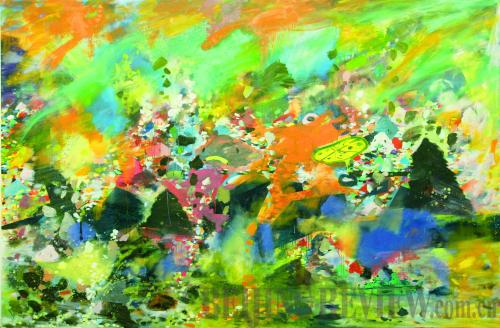|
 |
|
COURTESY PHOTO |
Generational changes
"In the past, being an artist was unthinkable. You had to be reconciled to being poor before you'd want to be an artist because there were no prospects whatsoever," says LiYu Yeo, the gallery manager at Red Gate Gallery in Beijing.
In previous decades, Chinese art had a very distinct style. "The past generation carried very strong Chinese elements and symbols in their work. That's how you knew [the work] was Chinese," explains UCCA's Li. "I think that's what the foreign community [associated] with Chinese contemporary artists: that [aesthetic]."
With the rise of the Internet and faster communications technology, everything changed. "It's not like before, where [Chinese artists] only saw what was happening in China," says Li. "Now those artists travel often. Their vision is much different. What they see, what they feel, it's not that different from foreign artists. We are in a same environment."
Young artists today operate in a new milieu. "With the art boom and the economy boom, it's become almost fashionable now [to be an artist]," says Yeo. "They have much more support from family," he adds, citing a 25-year-old painter showcased at Red Gate, Xie Guoping, as an example. Raised in rural Sichuan Province, Xie's parents are construction workers. His works, an homage to his family, explore themes of construction and destruction. "They have always been encouraging and supportive of him becoming an artist," says Yeo.
But is it really easier to be an artist in China today? "I think it's different," Li says. "Twenty years ago [artists] didn't know where to sell their work. They were literally 'starving artists,' and now they have so much competition from their colleagues and from overseas. They're facing different difficulties, you can't say it's easier or harder."
Representation
Jiajia Wang is represented in London by the Eleven Howland gallery but has no representation in Beijing. For the moment, he negotiates with Chinese galleries on his own. Last year he was exhibited at the XYZ Gallery in 798. "I don't want anything long term because I'm not sure which gallery I want to be with yet," he says. "I'm still learning about the Chinese market. It seems very different, it's not as organized, not as 'proper' as the Western system."
This phenomenon of artists operating successfully as free agents is unique. According to Yeo, it's a product of China's rapid contemporary development since economic reforms in the late 1970s. "It's not like in the West where there has always been a longstanding tradition of how things have been. China is starting on a clean slate. People are constantly trying all sorts of things to move ahead," he says. "From an artist's point of view, I can understand why they would want to do it, because it's a shot at expediency. They're hoping that they would sell works and gain exposure."
Li is succinct on the issue. "Artists are not managers," she says. "[Representing yourself] is like putting your weaknesses in front of everybody, which will also affect your creativity."
Wang is somewhat protected from that pitfall, because as he acknowledges, he's lucky to have been signed by an outside gallery. Although he's helming his own career in China, the work he gets from abroad keeps him busy. "I just concentrate on making paintings, I don't concentrate too much on the other aspects," he says. He's currently prepping for shows in London and Barcelona.
|